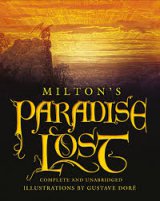Paradise Lost Page #9
Paradise Lost is an epic poem in blank verse by the 17th-century English poet John Milton. The first version, published in 1667, consisted of ten books with over ten thousand lines of verse. A second edition followed in 1674, arranged into twelve books with minor revisions throughout and a note on the versification.
The Stygian Councel thus dissolv’d; and forth In order came the grand infernal Peers, Midst came thir mighty Paramount, and seemd Alone th’ Antagonist of Heav’n, nor less Then Hells dread Emperour with pomp Supream, And God-like imitated State; him round A Globe of fierie Seraphim inclos’d With bright imblazonrie, and horrent Arms. Then of thir Session ended they bid cry With Trumpets regal sound the great result: Toward the four winds four speedy Cherubim Put to thir mouths the sounding Alchymie By Haralds voice explain’d: the hollow Abyss Heard farr and wide, and all the host of Hell With deafning shout, return’d them loud acclaim. Thence more at ease thir minds and somwhat rais’d By false presumptuous hope, the ranged powers Disband, and wandring, each his several way Pursues, as inclination or sad choice Leads him perplext, where he may likeliest find Truce to his restless thoughts, and entertain The irksome hours, till his great Chief return. Part on the Plain, or in the Air sublime Upon the wing, or in swift race contend, As at th’ Olympian Games or Pythian fields; Part curb thir fierie Steeds, or shun the Goal With rapid wheels, or fronted Brigads form. As when to warn proud Cities warr appears Wag’d in the troubl’d Skie, and Armies rush To Battel in the Clouds, before each Van Pric forth the Aerie Knights, and couch thir spears Till thickest Legions close; with feats of Arms From either end of Heav’n the welkin burns. Others with vast Typhoean rage more fell Rend up both Rocks and Hills, and ride the Air In whirlwind; Hell scarce holds the wilde uproar. As when Alcides from Oealia Crown’d With conquest, felt th’ envenom’d robe, and tore Through pain up by the roots Thessalian Pines, And Lichas from the top of Oeta threw Into th’ Euboic Sea. Others more milde, Retreated in a silent valley, sing With notes Angelical to many a Harp Thir own Heroic deeds and hapless fall By doom of Battel; and complain that Fate Free Vertue should enthrall to Force or Chance. Thir song was partial, but the harmony (What could it less when Spirits immortal sing?) Suspended Hell, and took with ravishment The thronging audience. In discourse more sweet (For Eloquence the Soul, Song charms the Sense,) Others apart sat on a Hill retir’d, In thoughts more elevate, and reason’d high Of Providence, Foreknowledge, Will, and Fate, Fixt Fate, free will, foreknowledge absolute, And found no end, in wandring mazes lost. Of good and evil much they argu’d then, Of happiness and final misery, Passion and Apathie, and glory and shame, Vain wisdom all, and false Philosophie: Yet with a pleasing sorcerie could charm Pain for a while or anguish, and excite Fallacious hope, or arm th’ obdured brest With stubborn patience as with triple steel. Another part in Squadrons and gross Bands, On bold adventure to discover wide That dismal world, if any Clime perhaps Might yeild them easier habitation, bend Four ways thir flying March, along the Banks Of four infernal Rivers that disgorge Into the burning Lake thir baleful streams; Abhorred Styx the flood of deadly hate, Sad Acheron of sorrow, black and deep; Cocytus, nam’d of lamentation loud Heard on the ruful stream; fierce Phlegeton Whose waves of torrent fire inflame with rage. Farr off from these a slow and silent stream, Lethe the River of Oblivion roules Her watrie Labyrinth, whereof who drinks, Forthwith his former state and being forgets, Forgets both joy and grief, pleasure and pain. Beyond this flood a frozen Continent Lies dark and wilde, beat with perpetual storms Of Whirlwind and dire Hail, which on firm land Thaws not, but gathers heap, and ruin seems Of ancient pile; all else deep snow and ice, A gulf profound as that Serbonian Bog Betwixt Damiata and mount Casius old, Where Armies whole have sunk: the parching Air Burns frore, and cold performs th’ effect of Fire. Thither by harpy-footed Furies hail’d, At certain revolutions all the damn’d Are brought: and feel by turns the bitter change Of fierce extreams, extreams by change more fierce, From Beds of raging Fire to starve in Ice Thir soft Ethereal warmth, and there to pine Immovable, infixt, and frozen round, Periods of time, thence hurried back to fire. They ferry over this Lethean Sound Both to and fro, thir sorrow to augment, And wish and struggle, as they pass, to reach The tempting stream, with one small drop to loose In sweet forgetfulness all pain and woe, All in one moment, and so neer the brink; But fate withstands, and to oppose th’ attempt Medusa with Gorgonian terror guards The Ford, and of it self the water flies All taste of living wight, as once it fled The lip of Tantalus. Thus roving on In confus’d march forlorn, th’ adventrous Bands With shuddring horror pale, and eyes agast View’d first thir lamentable lot, and found No rest: through many a dark and drearie Vaile They pass’d, and many a Region dolorous, O’re many a Frozen, many a Fierie Alpe, Rocks, Caves, Lakes, Fens, Bogs, Dens, and shades of death, A Universe of death, which God by curse Created evil, for evil only good, Where all life dies, death lives, and nature breeds, Perverse, all monstrous, all prodigious things, Abominable, inutterable, and worse Then Fables yet have feign’d, or fear conceiv’d, Gorgons and Hydra’s, and Chimera’s dire. Mean while the Adversary of God and Man, Satan with thoughts inflam’d of highest design, Puts on swift wings, and toward the Gates of Hell Explores his solitary flight; som times He scours the right hand coast, som times the left, Now shaves with level wing the Deep, then soares Up to the fiery concave touring high. As when farr off at Sea a Fleet descri’d Hangs in the Clouds, by Aequinoctial Winds Close sailing from Bengala, or the Iles Of Ternate and Tidore, whence Merchants bring Thir spicie Drugs: they on the trading Flood Through the wide Ethiopian to the Cape Ply stemming nightly toward the Pole. So seem’d Farr off the flying Fiend: at last appeer Hell bounds high reaching to the horrid Roof, And thrice threefold the Gates; three folds were Brass Three Iron, three of Adamantine Rock, Impenitrable, impal’d with circling fire, Yet unconsum’d. Before the Gates there sat On either side a formidable shape; The one seem’d Woman to the waste, and fair, But ended foul in many a scaly fould Voluminous and vast, a Serpent arm’d With mortal sting: about her middle round A cry of Hell Hounds never ceasing bark’d With wide Cerberean mouths full loud, and rung A hideous Peal: yet, when they list, would creep, If aught disturb’d thir noyse, into her woomb, And kennel there, yet there still bark’d and howl’d Within unseen. Farr less abhorrd then these Vex’d Scylla bathing in the Sea that parts Calabria from the hoarce Trinacrian shore: Nor uglier follow the Night-Hag, when call’d In secret, riding through the Air she comes Lur’d with the smell of infant blood, to dance With Lapland Witches, while the labouring Moon Eclipses at thir charms. The other shape, If shape it might be call’d that shape had none Distinguishable in member, joynt, or limb, Or substance might be call’d that shadow seem’d, For each seem’d either; black it stood as Night, Fierce as ten Furies, terrible as Hell, And shook a dreadful Dart; what seem’d his head The likeness of a Kingly Crown had on. Satan was now at hand, and from his seat The Monster moving onward came as fast, With horrid strides, Hell trembled as he strode. Th’ undaunted Fiend what this might be admir’d, Admir’d, not fear’d; God and his Son except, Created thing naught vallu’d he nor shun’d; And with disdainful look thus first began.
Translation
Translate and read this book in other languages:
Select another language:
- - Select -
- 简体中文 (Chinese - Simplified)
- 繁體中文 (Chinese - Traditional)
- Español (Spanish)
- Esperanto (Esperanto)
- 日本語 (Japanese)
- Português (Portuguese)
- Deutsch (German)
- العربية (Arabic)
- Français (French)
- Русский (Russian)
- ಕನ್ನಡ (Kannada)
- 한국어 (Korean)
- עברית (Hebrew)
- Gaeilge (Irish)
- Українська (Ukrainian)
- اردو (Urdu)
- Magyar (Hungarian)
- मानक हिन्दी (Hindi)
- Indonesia (Indonesian)
- Italiano (Italian)
- தமிழ் (Tamil)
- Türkçe (Turkish)
- తెలుగు (Telugu)
- ภาษาไทย (Thai)
- Tiếng Việt (Vietnamese)
- Čeština (Czech)
- Polski (Polish)
- Bahasa Indonesia (Indonesian)
- Românește (Romanian)
- Nederlands (Dutch)
- Ελληνικά (Greek)
- Latinum (Latin)
- Svenska (Swedish)
- Dansk (Danish)
- Suomi (Finnish)
- فارسی (Persian)
- ייִדיש (Yiddish)
- հայերեն (Armenian)
- Norsk (Norwegian)
- English (English)
Citation
Use the citation below to add this book to your bibliography:
Style:MLAChicagoAPA
"Paradise Lost Books." Literature.com. STANDS4 LLC, 2024. Web. 22 Nov. 2024. <https://www.literature.com/book/paradise_lost_101>.




Discuss this Paradise Lost book with the community:
Report Comment
We're doing our best to make sure our content is useful, accurate and safe.
If by any chance you spot an inappropriate comment while navigating through our website please use this form to let us know, and we'll take care of it shortly.
Attachment
You need to be logged in to favorite.
Log In